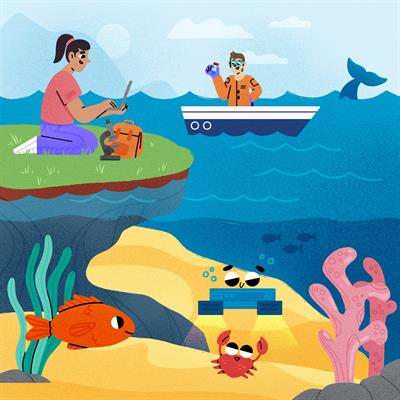
The Ocean, Volume 5
Collection Editors
Hervé Claustre, Carolyn Scheurle, Laura Lorenzoni, Sanae Chiba, Emily KingViews
50,360 viewsParticipating Sections
Submission Deadline
Closed
Articles

Biodiversity
10/06/2025
Do You Know that there are Fungi in the Ocean?
Authors
Jennifer Arroyo, Jason E. Stajich, Cassie L. Ettinger
Earth Sciences
30/05/2025
Can Ocean Swirls Help Fight Climate Change?
Authors
Yiming Guo, Mary-Louise Timmermans
Biodiversity
26/03/2025
Organisms That Create Homes for Other Organisms...
Authors
Nicole M. Cameron, Ricardo A. Scrosati
Biodiversity
26/02/2025
Life Among the Sand Grains
Authors
Will M. Ballentine, Nickellaus G. Roberts, Meghan K...
Biodiversity
05/02/2025
Parasites: The Hidden Hitchhikers of Cephalopods
Authors
Linda Yacsiri Guadalupe Marmolejo-Guzmán, Sheila...
Biodiversity
29/08/2024
Dugongs: Underwater Seagrass Detectors That Help...
Authors
Nicole Said, Anna Lafratta, Alexandra D’Cruz, Ankje Frouws...
Biodiversity
26/06/2024
The Diversity of Science Behind U.S. Seafood
Authors
Kristy Wallmo, Danika Kleiber, David Tomberlin, Phoebe...
Biodiversity
30/05/2024
How Might Browner Seawater Affect Marine...
Authors
Tharindu Bandara, Sonia Brugel, Agneta Andersson, Danny...
Biodiversity
30/05/2024
Playing Genetic Puzzles to Discover Unseen...
Authors
Xin Sun
Biodiversity
30/05/2024
Epigenetic Clocks: Using DNA to Estimate the Age...
Authors
Katharina J. Peters, Livia GerberAbout this collection
The ocean allowed life to develop on earth billions of years ago, it is vital for all of us and it will guarantee the future of humanity. The ocean is vast, deep, harsh and somehow “rebellious” to reveal its secrets and hence, there is much that is unexplored and not yet understood.Scientists need to study the ocean to better understand its functioning, its properties, as well as how it shapes our environment and impacts us. For example, do you know what the role of the ocean is on weather and climate? There also remains so much to explore and investigate as diverse oceanic resources (fish stocks, bio-molecules, renewable energies but also minerals, oil and gas…). How can we make sure that our use of these resources is respectfully done and sustainable and how can we minimize our impacts (e.g. pollution, acidification, deoxygenation) on the ocean as our human population increases?
In this Collection of Frontiers for Young Minds, ocean scientists from various disciplines explain recent discoveries or fundamental concepts. They share their knowledge and motivations and give insights into innovative tools and methods used to better understand our ocean. The Collection targets a large range of oceanic environments from the open ocean to the shores, the surface to the abysses including specific areas like coral reefs. It also targets the connections of the ocean with its interfaces (atmosphere, ice, coast). It seeks to cover marine disciplines that range from physics to chemistry, from biology and genomics to biodiversity and ecology, and from economy to conservation and policies. Finally, it encompasses a great variety of scales, ranging from the diel to geological time-scales, from loco-regional to global scales and also from the tiniest cells to the biggest living animals on our planet.
The United Nations have declared the 2021-2030 period as the “Decade of Ocean Science for Sustainable Development”, stressing the urgent need to approach fundamental issues related to the ocean and the future of humanity on well sounded scientific grounds and knowledge. The oceanic sciences are indeed undertaking a revolution thanks, in particular, to robotization and the massive intrusion of big data and artificial intelligence. This Ocean Collection aims to accompany this evolution to provide information to young readers that will help them to increase their understanding of the ocean and its central role in nature and our lives. We hope to empower them to make informed decisions in these challenging times and to engage to protect, study and enjoy its richness.
See here our previous Volumes: Volume 1, Volume 2, Volume 3 and Volume 4!
Would you like to submit to this collection?
For researchers interested in submitting to this Collection, please consult our author guidelines and check that you have all the essentials included before submitting





















